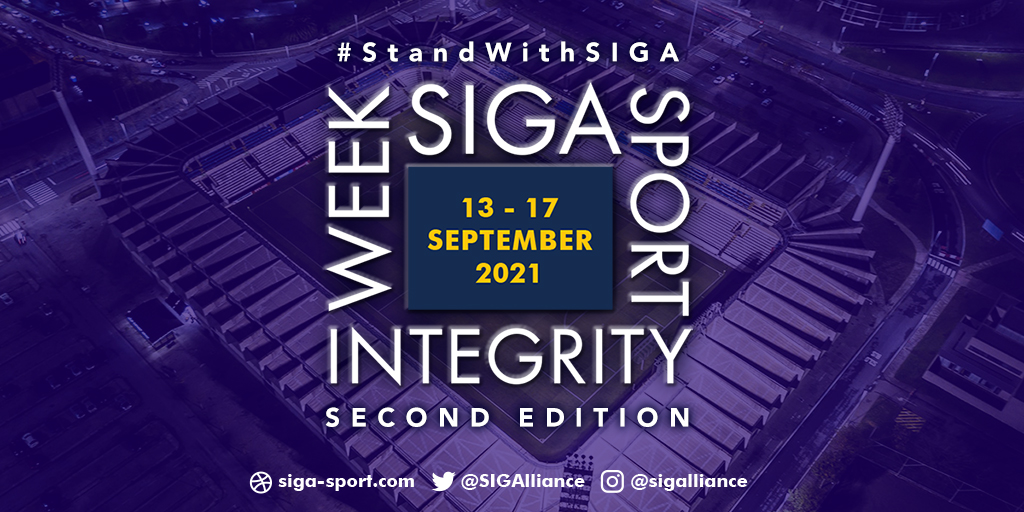Day 5 of SIW2021 was dedicated to Youth Development and Protection, and included a handful of surprises, such as the revelation by Arkady Dvorkovich that the International Chess Federation (FIDE) would go through the SIGA Independent Rating and Verification System (SIRVS)…
Don’t miss the chance to watch on-demand.
Day 1 / Part 1/2
SIGA / ILO Open Forum: Skills for Integrity in and through Sport
(Watch Here)
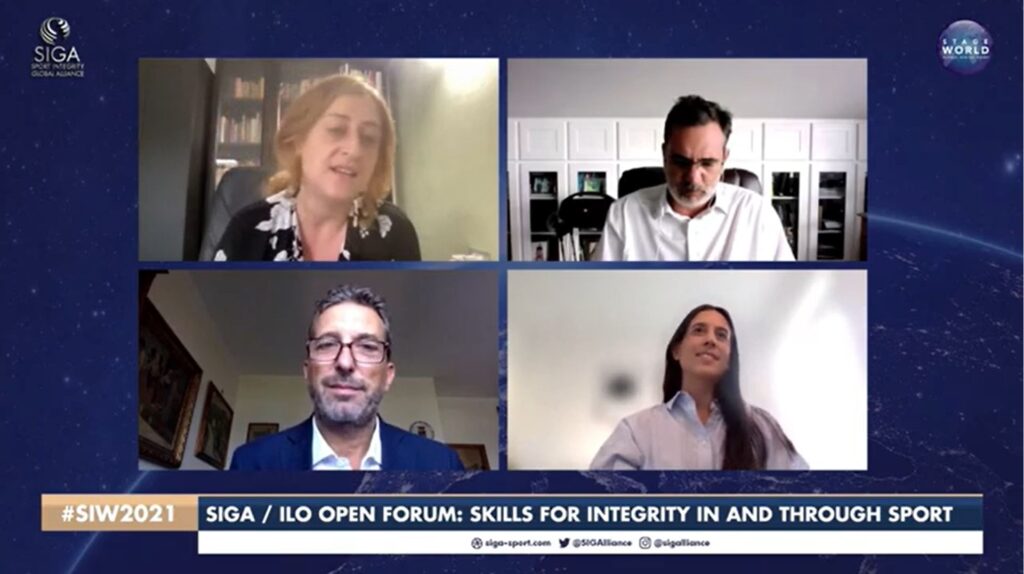
Competencies are the key to make the values related to integrity concretely applicable both in the correct application of a sports professionalism of each sportsmen and women, and in the management of sports organisations. Reflecting, training and acquiring these skills can therefore be strongly functional to the possibility of exercising the values of integrity in the real practices of the world of sports.
Eloisa Cianci, Coordinator MGCC and DRAWS Project, Catholic University | Executive Committee, Transparency International – Italy, moderated this panel, with the participation of three guests.
Diogo Guia, Chief Operating Officer & Director of Sports Public Policy, ICSS INSIGHT:
“Without integrity we don’t have sports, we have something else. At ICSS we deal with integrity of sports, safeguarding the integrity of sports. The International Centre for Spot Security understood integrity in a holistic manner, and of course we start from human rights, particularly related to high performance athletes. During their career, athletes are completely focused in performance, but they quickly understand, when they get out, that they have probably stopped formal education before the others, and have not developed social skills, and organisational skills that are the core of a formal education process”.
“Integrity breaches come from competition without values, cheating, lack of solidarity and team spirit, failing to give your best. In a nutshell, it’s all about values. Young athletes tend to think that when you speak about values, you are being. It’s nothing to do with morals. It’s just integrity. Integrity is the correspondence between what you say you will do, and what you do effectively, without ever compromising your values. It’s easy to identify an integrity breach when you see an athlete that is focused only on competition, and feel that he can cross all barriers”.
Sabrina Vettorato, Researcher, Instituto Internazionale Italiano Studi Sport Societa
“During a career, an athlete faces several crisis, so crisis management is really important. Soft skills are crucial, because when there are situations where integrity is in risk, having the idea on how to face such a crisis is really important. The absence of integrity can arrive at a point when you self-center focus only on performance, on reaching the goal. So, you need to have a good teamwork, to develop loyalty, as other skills can be easily distorted”.
Daniele Bettinetti, Senior Project Coordinator, Università Cattolica del Sacro Cuore
“Any action aimed at creating positive environment for skills, would be ideal to promote integrity activities. Top players are very well paid. There’s a lot of people that just do sports as a professional, but after the sport, when they reach the the age to retire, they have problems to find new work. There’s a lot of skills, like team worki, that could be very useful outside sports”.
Keynote: Hamad Nasser Al Missnid
(Watch Here)
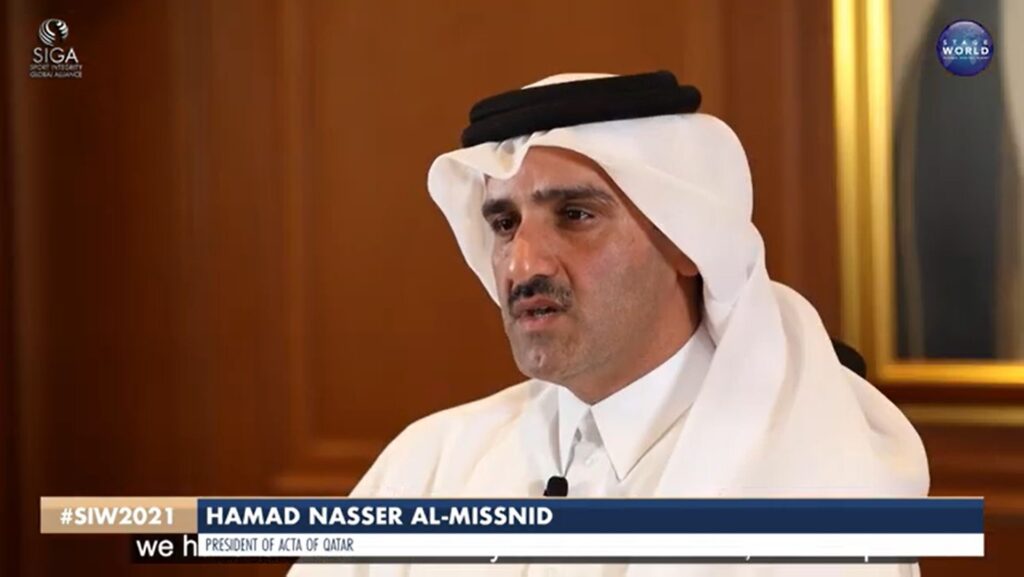
Hamad Nasser Al Missnid, President, ACTA of Qatar Keynote followed ILO / Open Forum.
STAGE OCEANIA: Integrity in Action
(Watch Here)
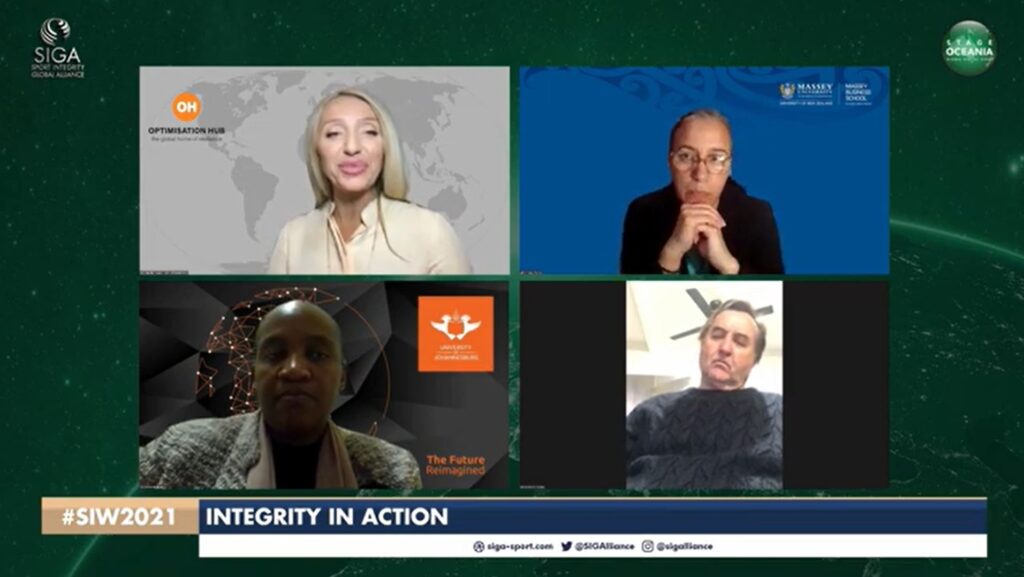
Graziella Thake, CEO Health Tech & International Events Resources Engagement Specialist, The Optimisation Hub, took over the Oceania Stage to moderate this panel.
In times of transition, hardship and cost cutting are governance decision disparities reflections of hard economics or something more? What can Oceania learn from other continents in this regard? We took a look at inclusive sport in Africa and ask some tough questions. As we approach a critical juncture in sports history how will the governance decisions made now impact on Oceanic sport for generations to come? Is it time to move past gender and define Sport more holistically or is it more imperative to have hardline economic policies that are gender neutral and less concerned about parity – despite the implications? These extremely nuanced and highly charged questions were evaluated in this exciting session!
With:
Nomsa Mahlangu, Senior Director of the Johannesburg Sport Bureau. The Federation of Africa University Sports (FASU) – First-ever Female President
Farah Palmer, Vice Chair, NZRFU
Murray D’Almeida, Deputy Chancellor, Southern Cross University; Chair, The Audit and Risk Management Committee
Keynote / Fireside Chat – Arkady Dvorkovich
(Watch Here)
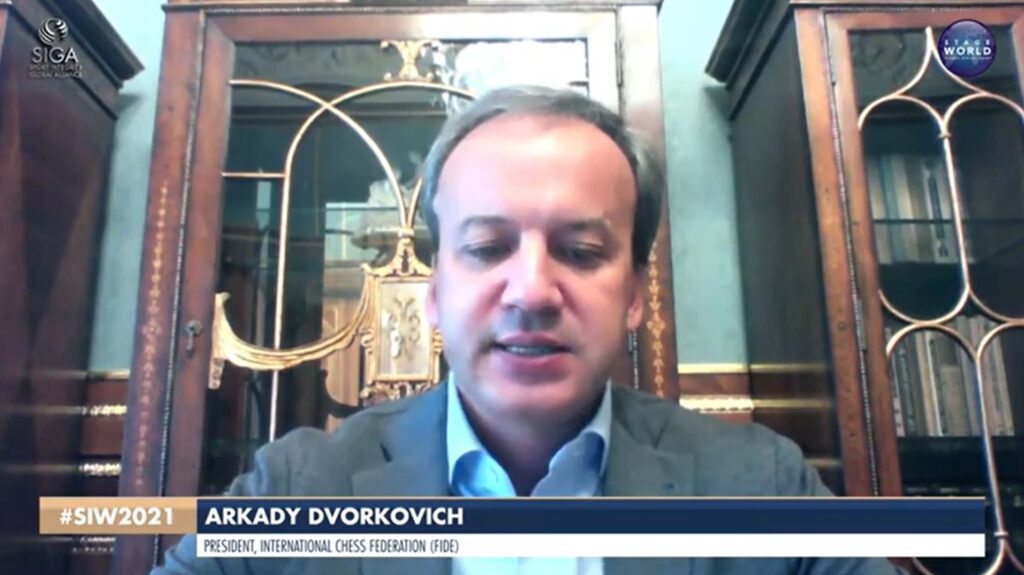
Arkady Dvorkovich, President, International Chess Federation (FIDE) addressed a Keynote on Sport Integrity, and made a connection between Chess and the best practices. After that, Arkady Dvorkovich joined Emanuel Macedo de Medeiros, Global CEO, SIGA, and revealed FIDE is going through SIRVS.
Keynote – Giovanni Di Cola
(Watch Here)
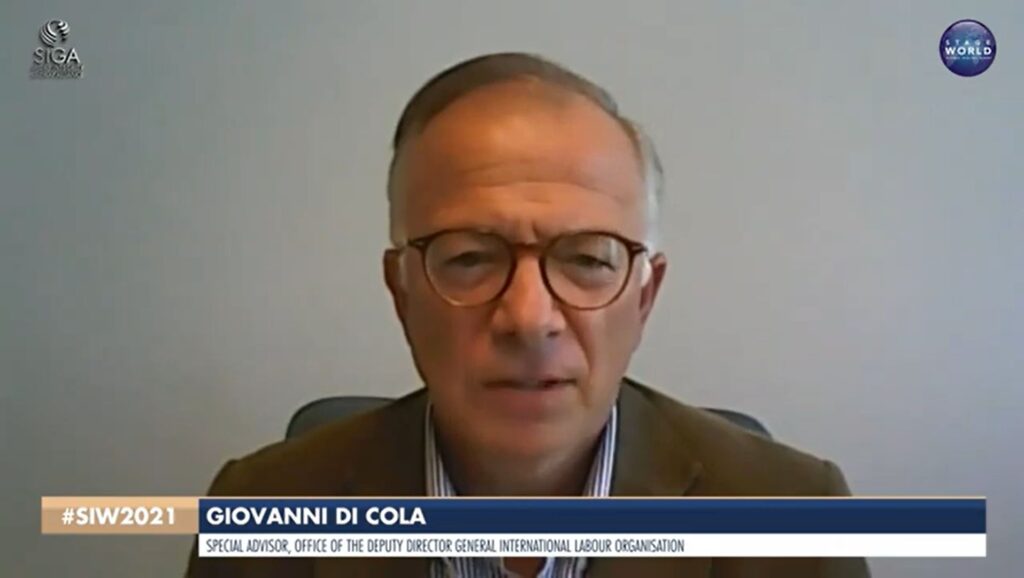
Giovanni Di Cola, Special Advisor, Office of the Deputy General, International Labour Organisation addressed a Keynote on “From SDP to Integrity: Shifting Gears for 20 Years”.
Youth Development & Protection: Setting the New Gold Standard for Sport
(Watch Here)
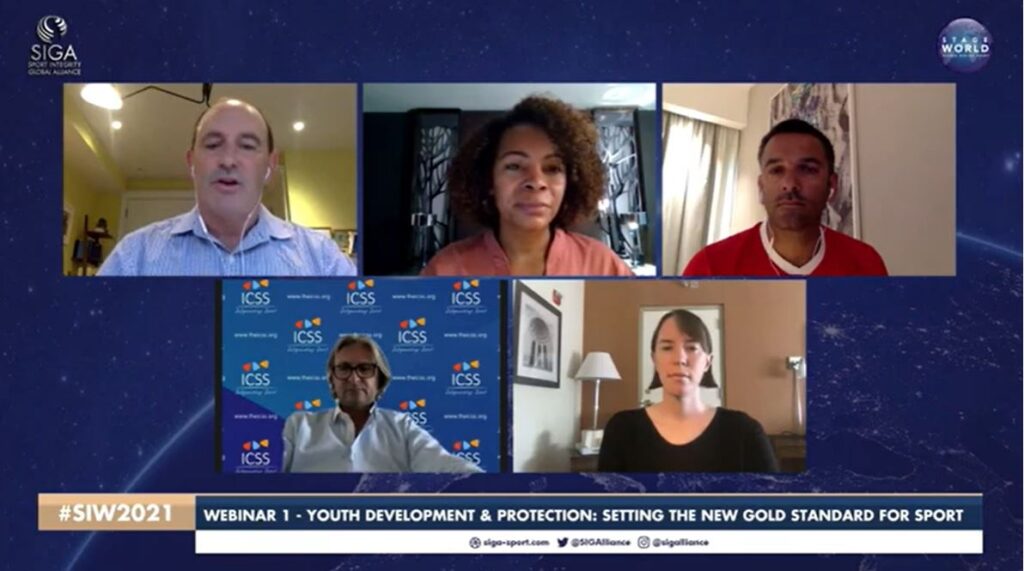
Global awareness of Sport-related incidents of mental and physical abuse of children, young or vulnerable people, both on-and-off the field the play continues to grow at steady pace. However, despite the increasing coverage of cases on television, streaming services and via social media, this issue still does not receive the attention it needs and fully deserves. Commonly concealed and refuted, this is leaving many still vulnerable and, in the long-term, severely affected. Until now, the sporting industry has been more reactive than proactive. This is no longer acceptable! SIGA’s pioneer project for developing Universal Standards on Youth Development and Protection in Sport is underway, led by SIGA AMERICA and driven by a high-level task force comprising subject matter specialists. Watch debate these critical issues, examine best practice and point out the pathway to reform. Dan Mannix, SIGA AMERICA Advisory Board Chair, and CSM North America, Senior Advisor & Former CEO was the moderator of this panel.
Ju’Riese Colon, CEO, US Center for SafeSport
“We’ve come a long way over the last several decades, when it we think about child protection, particularly of minors, whether they’re in sports or not. A lot of organisations are pretty comfortable with the fact that they’ve got background checks and screenings for their staff. They’re comfortable with the fact that they’ve got to have sustainable education and prevention around abuse to prevent sexual, physical and emotional misconduct. Where I think that we are still struggling a little bit is that it’s hard to implement a lot measures, and it’s hard to monitor them to make sure that kids are always in the safest environment possible”.
João Paulo Almeida, Director General, National Olympic Committee of Portugal; Member, SIGA Council
“Safeguarding issues, when compared to other integrity issues like doping or manipulation of sports competition is in his baby steps in Europe. A lot of work has to be made, and one important topic that we need to take into account is the need to move from working from silos into a network approach, convening child protection agencies, law enforcement and other stakeholders. It’s quite relevant, because this is a problem that goes way beyond the remit of the spot governing bodies, and one of the key issues that has to be overcome.”
Massimiliano Montanari, CEO, International Centre for Sport Security
“I always have the the tendency to look at the glass as a half full, rather than half empty. Having worked specifically in the field of the safeguard of sport in the last 10 years, I can see that there’s been quite a huge progress, particularly at the policy making level. The work done by SIGA is a is a good example of this, and also there are other platforms which have been very active. From a policy viewpoint, I think we are doing well. There are still certainly gaps, and work to be done, but i’m quite positive about what we have achieved. When we look at capacity building, we can also see some good practices. For instance, FIFA has a very strong capacity building program in place. I would like to see a little bit more of interaction between the sport movement and governments. Sport movements should not be afraid of working with government, because working with government it doesn’t mean that they’re reducing their independence. It means they are joining forces to fight against common enemies.”
Cassidy Lichtman, Chair, Player Executive Committee for Athletes Unlimited Volleyball; Founder of P/ATH
“There’s been a lot of progress, as everybody has talked about. In terms of athlete’s voice, that’s where we’re making big strides. In terms of activism, we are now able to see that on the world stage. Athletes are speaking out, but also domestically there’s been a really big push towards including athlete’s voice within the institutions. As a board member of USA volleyball, we’ve been talking about that. It’s been mandated by congress that there’s athlete voice represented in the US Olympic and Paralympic committees, and the national governing bodies. Being part of athletes unlimited, it’s been fascinating to see the level to which you can include athlete’s voice”
— END —
ABOUT SIGA
SIGA is the world´s largest coalition in the field of sport´s governance and integrity. Supported by more than 100 international multi-industry supporters, SIGA is an independent and neutral organisation whose mission is to bring about meaningful reforms and enhance the integrity of all sports through a set of universal standards operated by an independent and neutral body. SIGA is the only organisation to bring together sport, governments, academia, international organisations, sponsors, business, rights holders, NGOs and professional services companies, from every region in the world, around a common cause of fostering greater integrity throughout sport.
Click on the hyperlinks for the list of SIGA Members and Committed Supporters and SIGA Partners.
For more information on SIGA, including its vision, mission and reform agenda, please refer to the website: www.siga-sport.com.
To contact SIGA, please email: comms@siga-sport.com.

